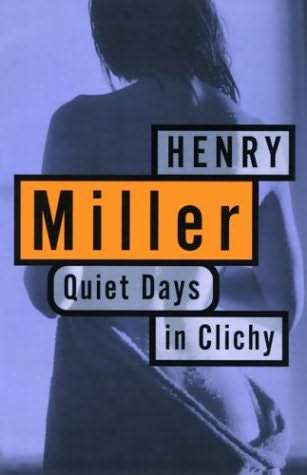
We enjoyed this passage from Henry Miller’s Quiet Days in Clichy. The book covers some of Miller’s adventures living there in the 1933. The character “Carl” below is his flat mate Alfred Perles, the Austrian writer.
Give this passage a minute of your time. We like Miller’s outlook here and find him very much an absurd man:
“For an artist bad situations are just as fertile as good ones, sometimes even more so. For him all experience is fruitful and capable of being converted to credit. Carl was the type of artist who fears to use up his credit. Instead of explaining the realm of experience, he preferred to safeguard his credit. This he did by reducing his natural flow to a trickle.
Life is constantly providing us with new funds, new resources, even when we are reduced to immobility. In life’s ledger there is no such thing as frozen assets.
What I am getting at is that Carl, unknown to himself, was cheating himself. He was always endeavoring to hold back instead of giving forth. Thus, when he did break out, whether in life or with the pen, his adventures took on a hallucinating quality. The very things he feared to experience, or to express, were the things which, at the wrong moment, that is to say when least prepared, he was forced to deal with. His audacity, consequently, was bred of desperation. He behaved sometimes like a cornered rate, even in this work. People would wonder whence he derived the courage, or the inventiveness, to do or say certain things. They forgot that he was ever at a point beyond which the ordinary man commits suicide. For Carl suicide offered no solution, if he could die and write his death, that would be fine. He used to say on occasion that he couldn’t imagine himself ever dying, barring some universal calamity. He said it not in the spirit of a man filled with a superabundance of vitality; he said it as one who refused to waste his energy, who had never allowed the clock to run down.
When I think of this period, when we lived together in Clichy, it seems like a stretch in Paradise. There was only one real problem and that was food. All other ills were imaginary. I used to tell him so now and then, when he complained about being a slave. He used to say I was an incurable optimist, but it wasn’t optimism, it was the deep realization that, even though the world was busy digging its grave, there was still time to enjoy life, to be merry, carefree, to work or not to work.”
Just a few comments on this passage. The absurd elements are palpable here: The emphasis on experience in the beginning and the fruitfulness of all experiences, “good” and “bad.” And especially, the last paragraph, which sums up the cheerful aspects of the absurd life – trying to always find a way, trying to always find some time, to just be.



A quick reflection on Miller, by way of "Tropic of Cancer"...
ReplyDeleteOne of Jack's favorite things about Miller is the way he embraced life with gusto, even when it was shitty. And he never shied away from the shitty parts. Either. If you'll pardon the imagery, Miller saw no point in "buffing a turd" to borrow a Madison Avenue phrase... instead he would describe tbe turd in full honest glory.
When I first started reading ToC, I didn't really get it. Perhaps I was trying to read too much meaning into it. (Heh.) But then once I fell in with Miller's devil may care rhythms -- his semi-manic, whimsical / comical descriptions of whores bedded, hardships endured and too many amusing / tragic moments to count -- the whole book just became a sort of passionate romp.
And again, the neat thing was -- and the Clichy passage reminded me of it -- Miller never tried to sugar coat the hard parts of the experience. He wrote about the bad and the ugly with just as much zest as the good.
And, in doing so, he sort of reclaimed and redeemed those experiences in a way that made perfect sense to Jack.
In our better moments, we all sort of do this to some degree... think of a life experience that was awful or infuriating or demoralizing at the time, but wound up being good story fodder later... a point of reminiscence and laughter well down the road.
This, to me, seems to encapsulate a refreshingly honest and passionate (and perhaps absurd?) approach to life. Taking the bad with the good... but instead of trying to anesthetize the bad or drain it of vitality, reclaiming the pain through zestful observation. Treating it as life lesson, creative fodder and amusement park ride, all rolled into one.
Well said. Henry Miller is one of our favorite writers, but we admit that people seem either to love him or hate him.
ReplyDeleteFor a softer introduction to Miller, we recommend the Colossus of Maroussi, which is about his trip to Greece on the eve of WWII.
The Tropic of Cancer book is, of course, what he is most famous for, and is a wild romp for sure.
Inigo